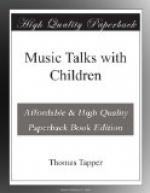One day, as he walked in his yard, he noticed that between two of the stones there seemed to be something and he looked at it. With the greatest attention he studied it, then he knelt on the rude stones and looked and looked again. His heart beat and his hands trembled, but yet with a touch as gentle as any one could give, he moved a grain or two of soil and there, beneath, was something which the poor captive cried out for joy to see—a tiny plant. As if in a new world, and certainly as if another man, he cared daily for the tender little companion that had come to share his loneliness; he thought of it first in the morning and last at night. He gave it of his supply of water and, as a father, he watched over it.
And it grew so that one day he saw that his plant must either die or have more room. And it could not have more room unless a cobblestone were removed. Now this could only be done with the consent of the Emperor. Well, let us not stop to hear about the way he found, but he did get his request to the Emperor and, after a while, what happened do you think? That the plant was given more room? Yes, that is partly it, and the rest is this: the prisoner himself was given more room—he was liberated.
Just because the seed of a beautiful thing came to life in his tiny world he found love for it and a new life, a care, something outside of himself. And it brought him all.
That love which is not given to self reveals the beauty of the world.
CHAPTER XXII.
IN SCHOOL.
“Every successive generation becomes
a living memorial of our public
schools, and a living example of their
excellence.”—Joseph Story.
In these days we learn many things in our schools—even music. They surely must have a purpose, all the studies and the music as well. Let us in this Talk see if we can find what the purpose is.
It costs our Government a great deal to educate the children of the land. There are now nearly twenty million children in our country. That is a number you cannot conceive. But every morning of the year, when it is not a vacation day, you may think of this vast number leaving home and going to school to be taught. I am sure the picture will make us all think how wise a Government is that devotes so much to making us know more, because by learning more we are able to enjoy more, to do more, to be more. And this makes us better citizens.
Year after year, as men study and learn about what is best to have children taught in school, the clearer it becomes that what is given is dictated because of its usefulness. Arithmetic teaches us to calculate our daily affairs. Grammar teaches us to listen and to speak understandingly. Penmanship and Spelling teach us properly to make the signs which represent speech. Geography teaches us of the earth on which we live, and how we may travel about it. History teaches us how to understand the doings of our own day and makes us acquainted with great men of former times, who by striving have earned a place in our remembrance.




